Open Call Introduction
Tarenna Collective is delighted to announce ‘Composer’s Drawing Board Vol. 2’, an open call for a new commissioned work to be premiered on 13 October 2026 at Esplanade Recital Studio. The selected composer will receive SGD$2000 to write a new work of 10 to 15 minutes duration for 2 to 5 instruments from the following instrument list:
2 violins
1 viola
1 cello
1 flute/piccolo/alto flute
For this iteration of the project, applicants are invited to respond to the theme of ‘Displacement’ for their proposed new work (see description below). In addition to being commissioned to write a new work, the selected composer will collaborate with the musicians (see Annex 2) to program the rest of the concert repertoire (see 'Repertoire Suggestions'). The concert programme should draw connections between the commissioned work and the musical cultures that inform it, forming a snapshot of the commissioned composer’s sound world. A maximum of two pieces by the selected composer is thus allowed for the proposed concert program, as a traditional composer portrait concert is not desired in this open call. The selected composer must be willing to physically present the concert in collaboration with the musicians, and to be interviewed as part of publicity efforts as decided by Tarenna Collective.
Open Call Theme
The theme for this iteration is ‘Displacement’. Most literally, displacement describes the physical phenomenon of an object changing its position. In music, displacement is perhaps literally most easily described in rhythm, as one rhythmic pattern is temporally offset against another. Beyond this, displacement can be viewed as an emotional experience and a part of social history, particularly in the context of diasporic experiences and colonial histories. The largely oppositional nature of human-nature relations in the Anthropocene is also manifested in the displacement of flora and fauna enacted by humans. The above-mentioned ideas are merely examples, and applicants should feel free to interpret the theme as it best speaks to their artistic interests.
Submission Requirements
Applicants for this open call are required to submit the following items in the following formats:
Notated sketches (lasting about a minute or so, in pdf)
A written proposal with a maximum length of 500 words for the commissioned work (.pdf)
A sample programme of music lasting between 40 and 60 minutes for the concert (in pdf) that can be played by any combination of the instruments listed above, with a short explanation for the repertoire choices in the form of a video with a maximum duration of 7 minutes (.mp4)
A portfolio of full scores of two past works for contrasting combinations of instruments, with programme notes, of which at least one should include some combination of the instruments listed for this commissioning call, if possible (.pdf)
Recordings of the two works submitted as part of the portfolio in mp3 (MIDI and live recordings are both ok, although live recordings are preferred)
A 200-word biography of yourself (.pdf)
To maintain participants’ anonymity, we would like all participants to pick a random 3-digit number from 000 to 999 and name each file in the following convention (where XYZ represents the 3-digit number):
XYZ_CommissionedWorkSketch.pdf
XYZ_CommissionedWorkProposal.pdf
XYZ_SampleConcertProgramme.pdf
XYZ_ConcertProgrammeExplanation.mp4
XYZ_(Name of Piece 1).pdf
XYZ_(Name of Piece 2).pdf
XYZ_(Name of Piece 1).mp3
XYZ_(Name of Piece 2).mp3
XYZ_Bio.pdf
All of the files listed above should be submitted in one email to opencall.tarennacollective@gmail.com. Use of a file-sharing service such as Google Drive, Dropbox or WeTransfer is encouraged, but applicants should ensure that all of the files are accessible through one email. Do NOT indicate your name in any of the files, except your biography. For details on how the open call will be judged, please see the section ‘Judging Process’.
By submitting an application for this open call, composers consent to the musicians retaining their materials for future reference.
Eligibility
This open commissioning call is open to all Singaporean/Singapore-based composers above the age of 14 years as of 1 January 2026, although emerging composers are preferred and strongly encouraged to apply. ‘Emerging’ can be variously defined, and could include not having been commissioned before, not having been performed publicly before etc. Past winners of the Composer’s Drawing Board series are ineligible to apply.
Past Winners
2024 – Ding Jian Han
Judging Process
Submitted applications will be assessed twice. The first round will be a blind judging based on the applicants’ sketches and composition portfolios, resulting in a shortlist of applicants. In the second round, the musicians [See Annex 2] will reassess the applicants based on their proposed concert programmes, and take into consideration the experience of the composers (with reference to their biographies), before a final selection is made. There are no limits to compositional style; key criteria during the judging process include coherence of the proposed program and original, conceptually-strong compositional ideas that explore their topics of interest while also putting contemporary classical music in a new, accessible light. Applicants are highly encouraged to consider the feasibility of their proposed concert program by referring to the repertoire list below (‘Repertoire Suggestions’). All applicants with complete applications will receive feedback on their applications regardless of outcome, as we hope to support all applicants in their compositional journeys in whatever small ways we can.
Timeline
25 October 2025 — Open Call begins
1 January 2026 — Open Call closes
By 31 January 2026 — Selected composer announced
16 February 2026 — First draft due/ Concert programme to be finalised
9 March 2026 — Workshop of first draft
1 July 2026 — Final score due
13 October 2026 — Concert
Repertoire Suggestions
The pieces listed here have been selected by the musicians of the ensemble as potential works to be performed on 13 October 2026. Applicants are highly encouraged to have a listen to the works on this list and to incorporate some of these works listed here into their proposed concert programmes if possible. Applicants are more than welcome to propose works other than those on this list which use instruments listed in the project instrumentation list (see 'Open Call Introduction').
Giuseppe Maria Cambini, Flute Quartets
Anthony Cheung, The Real Book of Fake Tunes for flute and string quartet
Alberto Ginastera, Impresiones de la puna for flute and string quartet
Toshio Hosokawa, Fragmente II for alto flute and string quartet
Pierre Jalbert, Air in Motion for flute and string quartet
Mauricio Kagel, Pan for piccolo and string quartet
Joseph Kosma arr. Toru Takemitsu, Autumn Leaves for string quartet
Friedrich Kuhlau, Flute Quintets
Einojuhani Rautavaara, The Last Runo for flute and string quartet
Joan Tower, Rising for flute and string quartet
Paul Wiancko, Cities of Air for flute and string quartet
Zhou Tian, Viaje for flute and string quartet
Submission Deadline
The deadline for submission of scores is 1 January 2026, 11:59:59 PM SGT via email / file-sharing links to opencall.tarennacollective@gmail.com. If you encounter any technical difficulties during submission, or have any questions about the open call, please do not hesitate to email opencall.tarennacollective@gmail.com for help.
Musicians' Biographies
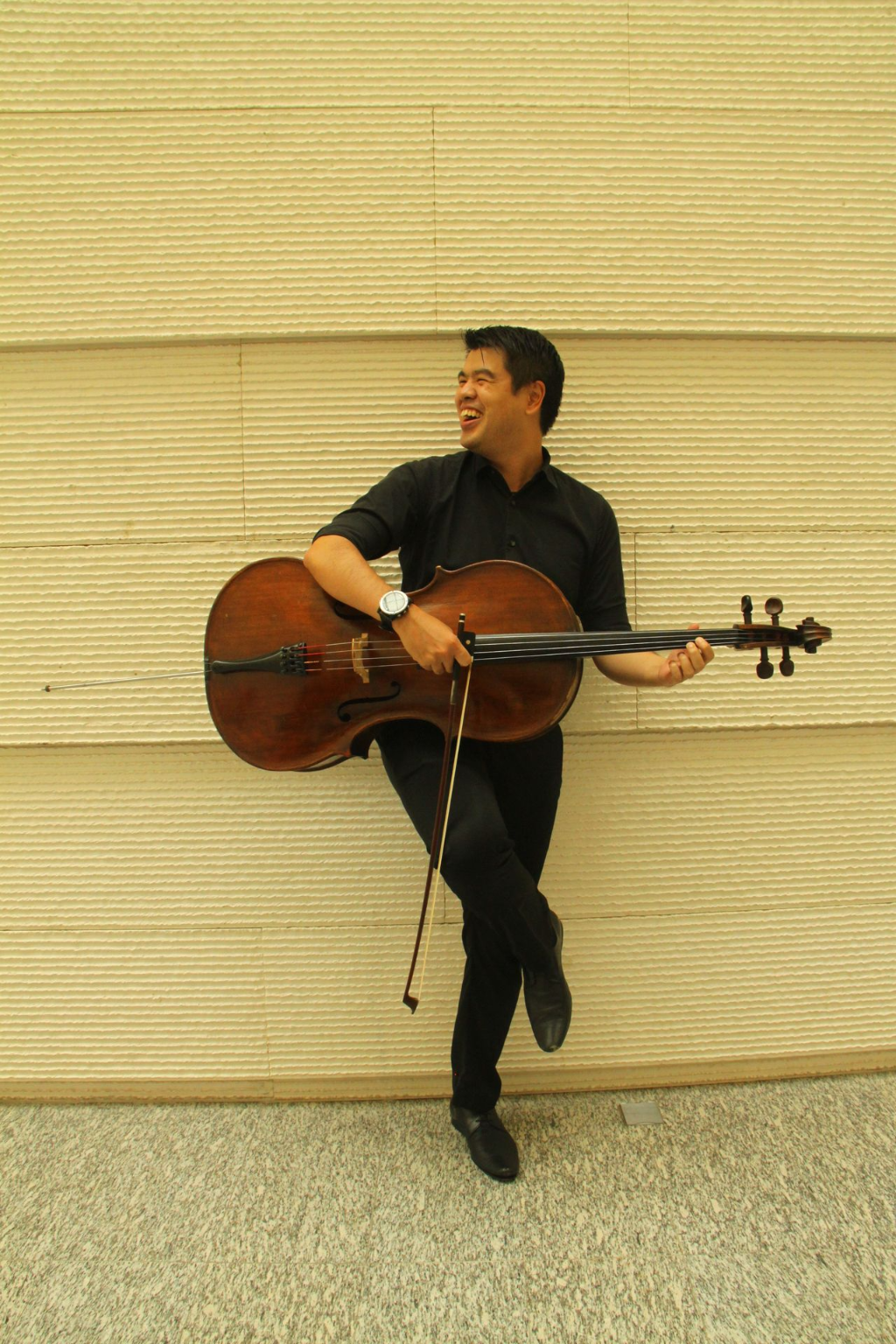
Chan Sihan
Chan Sihan started playing the cello when he was 8. He learnt under Chan Wei Shing, Herminia Ilano and obtained a Diploma in Music Performance from the Nanyang Academy of Fine Arts under the tutelage of Yu Jing. In 2015, he graduated with a Bachelor of Music with Honors with the Royal College of Music, in collaboration with the Nanyang Academy of Fine Arts, learning under Guo Hao in Singapore, and Alexander Boyarsky in London.
Sihan has played in numerous ensembles and orchestras, including the Metropolitan Festival Orchestra, Singapore Festival Orchestra, Singapore Chinese Orchestra, The Philharmonic Orchestra, Singapore Lyric Opera, Philharmonic Youth Winds ensemble, the Singapore Armed Forces Band, the Chamber Players, and the Singapore National Youth Orchestra, in which he was the associate principal of the cello section in 2006, to name a few.
Sihan is currently a freelance chamber and orchestral musician. Apart from music, he has a passion for diving and is also a certified scuba-diving instructor who yearns for the ocean whenever he has the time.
Jeremy Chiew
A recipient of the Patricia Sherman 'in honour of a high level of accomplishment, an exemplary attitude and a record of contribution to the life of the Longy Community’, Jeremy Chiew studied at and obtained a Masters in Music Performance (Viola) from the Longy School of Music and was under the tutelage of Dimitri Murrath.
Described by The Straits Times as “the one person in Singapore who has championed the cause of the viola more than any other... his sheer single-mindedness has resulted in an unprecedented series of concerts edging the (viola)... firmly into the limelight.” Jeremy actively performs as a violist with various local ensembles and chamber groups, and balances a varied teaching schedule comprising of classes at the Nanyang Academy of Fine Arts, school string ensembles and private students, and is the current Principal Conductor of Ngee Ann Polytechnic Strings.
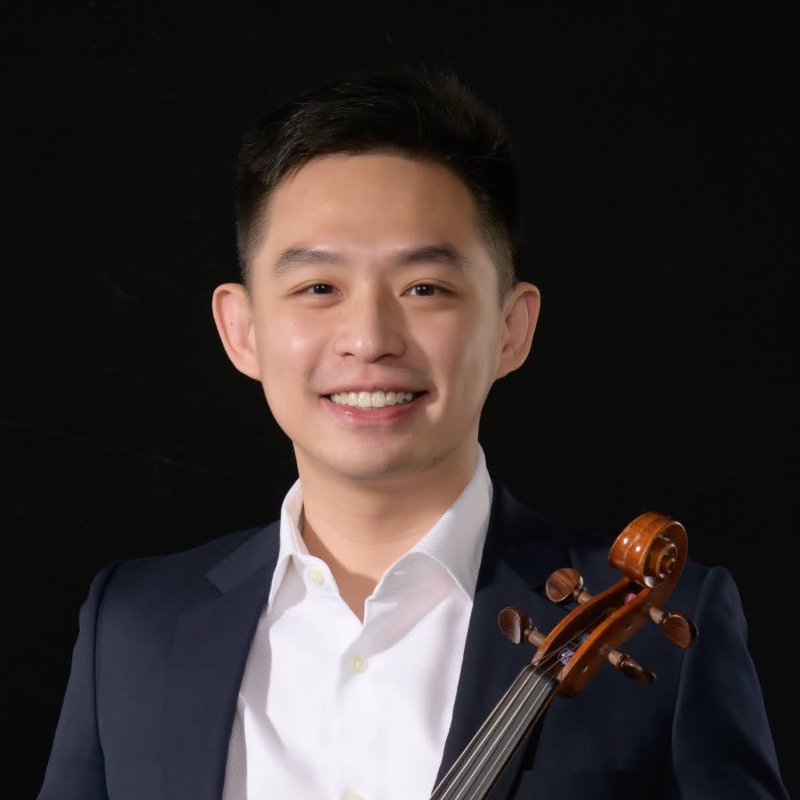
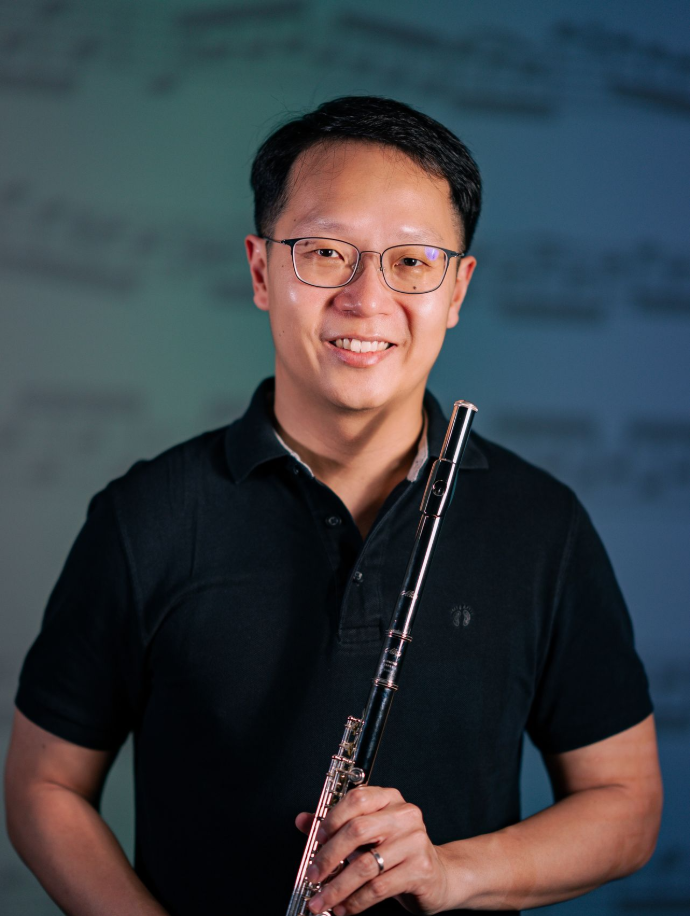
Paul Huang
Paul Huang is an accomplished flautist and music educator with extensive experience in both fields. He began his music career as a professional flute player in the Singapore Armed Forces Central Band. He has taught in various settings, including large ensembles like orchestras, wind bands, and choirs, as well as individual music theory and flute lessons. More recently, Paul has expanded his expertise by lecturing on performance psychology and musician's health and well-being at the Nanyang Academy of Fine Arts (NAFA). Paul received his Bachelor of Music in flute performance from the Royal College of Music (RCM) and NAFA in 2015 and subsequently won 2nd prize in the open category of the Singapore Flute Festival in 2016. Driven by his passion for scientific research in music, Paul pursued postgraduate studies in Performance Science at the RCM. He has training in performance psychology and cognitive behavioural therapy, and aims to help musicians perform better by going beyond traditional music education.
Tan Tiag Yi
Tan Tiag Yi is a Singaporean violinist, composer and arts administrator. He completed his Bachelor of Arts in Music with First Class Honours at St Anne’s College, University of Oxford in 2021, where he studied composition with Professor Martyn Harry and violin with Caroline Balding. Tiag Yi is a founding member of Duo Tarenna, a new violin-viola duo based in Singapore championing uncharted repertoire which was established in 2021. As a passionate performer of contemporary music, Tiag Yi was fortunate to receive a bursary to attend the 2021 Dartington Summer Music School & Festival, where he participated in violin masterclasses with genre-crossing violinist Thomas Gould and chamber music coachings with members of the Leonore Piano Trio. As a composer, Tiag Yi is fascinated by the semiotic resonances of sounds and the ways time is experienced. His compositions play off a multiplicity of influences whose concordances, disjunctures and deviations productively interact to create fragile and compelling sound worlds.
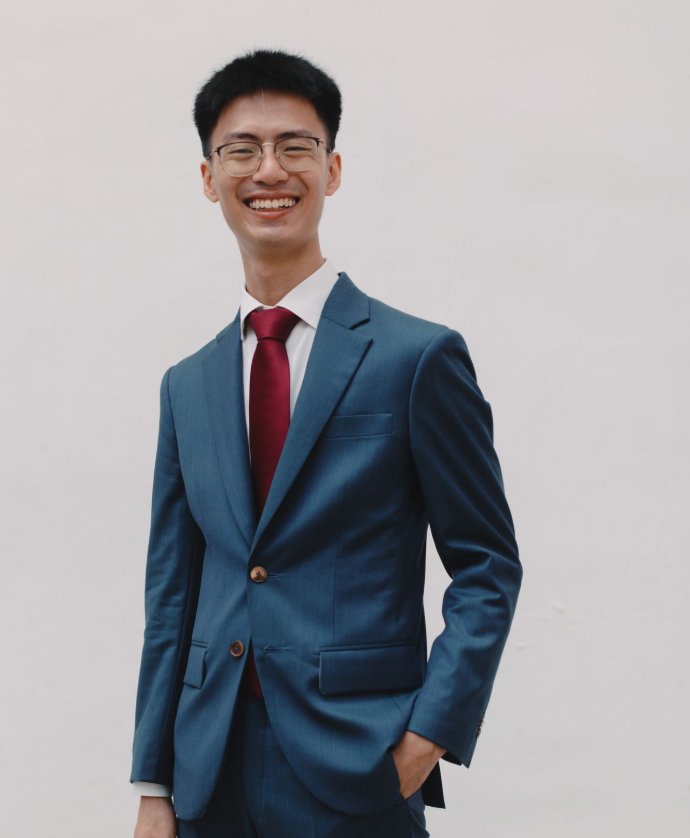
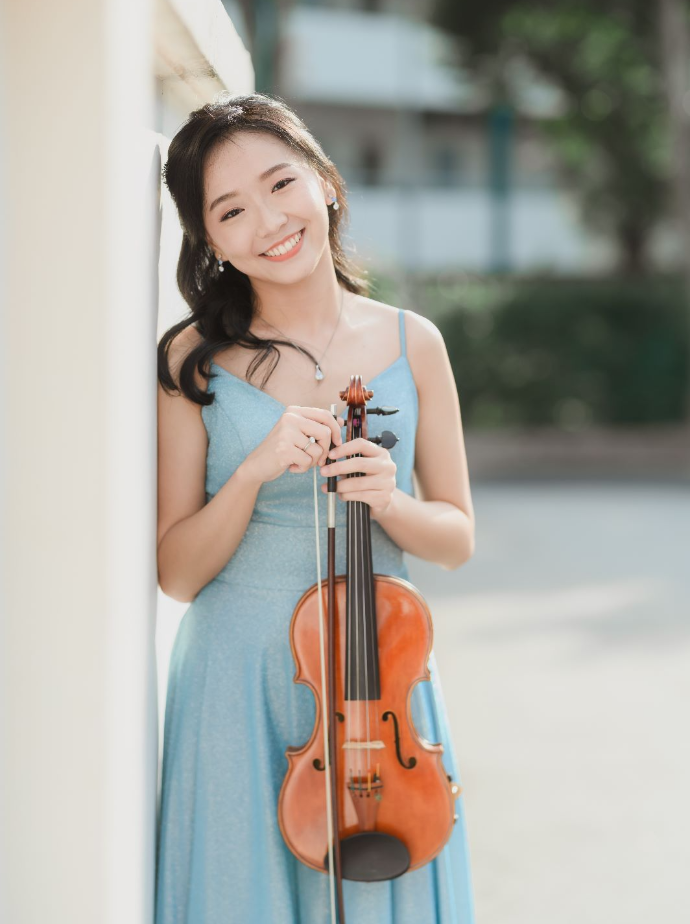
Farah Wu
Farah Wu is a Singaporean violinist, pianist and conductor known for her versatility and authenticity. She holds a Master of Music degree in Violin Performance from the University of Illinois Urbana-Champaign under the tutelage of Dr. Salley Koo and Megan Freivogel, as well as Bachelor of Music (Hons) from the Royal College of Music, where she studied violin with Michal Cwizewicz, Itzhak Rashkovsky, and Berent Korfker, alongside piano with Kathron Sturrock. Before her international studies, she trained under Marietta Ku (violin) and Timothy Ku, Paul Liang, and Alice Ng (piano).
Farah pushes artistic boundaries through performance, education, and creative exploration. Whether premiering contemporary works, delving into historical performance practices, or mentoring young musicians, she is dedicated to making music accessible and engaging for diverse audiences. With a deep passion for storytelling through sound, she strives to inspire and connect with listeners across genres and generations.